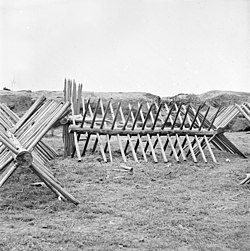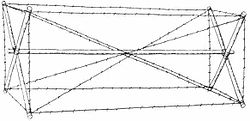Cheval de frise


The cheval de frise (plural: chevaux de frise
The invention of the cheval de frise is attributed to ancient China. The concept of using a defensive obstacle made of wooden or metal stakes predates its use in Europe. Historical records suggest that similar types of defensive barriers, known as "teng pai" or "mó pai", were used in China as early as the 4th century BC. These early versions of the cheval de frise were employed to protect cities, forts, and other strategic locations from enemy attacks. In Ming dynasty military treatises, it was known as the juma (拒馬, lit. 'Horse repeller') or lujiao (鹿角, deer horn).
The use of chevaux de frise spread to Europe during the Middle Ages and became a common feature of medieval fortifications. They were used extensively in castle defenses and military campaigns, particularly during the Renaissance and early modern periods. However, the original concept and early usage of the cheval de frise can be traced back to ancient China.
During the American Civil War the Confederates used them more than the Union forces.[2] During World War I, armies used chevaux de frise to temporarily plug gaps in barbed wire.[3][4] Barbed wire chevaux de frise were used in jungle fighting on the South Pacific islands during World War II.
The term is also applied to defensive works on buildings. This includes a series of closely set upright stones found outside the ramparts of Iron Age hillforts in northern Europe,[5] or iron spikes outside homes in Charleston, South Carolina.[6]
Etymology

In French, cheval de frise means "Frisian horse".[7][8] The Frisians fought predominantly using cavalry;[9] they were known for being formidable horsemen, and Frisian horses were renowned for their strength and agility. Therefore, for defense they relied heavily on anti-cavalry obstacles. The Dutch also adopted the use of these defensive devices when at war with Spain. The term cheval de frise came to be used for any spiked obstacle, such as broken glass embedded in mortar at the top of a wall.
The cheval de frise was adopted in New York and Pennsylvania during the American Revolutionary War as a defensive measure installed on rivers to prevent upriver movement by enemy ships. During the Peninsular War, at the siege of Badajoz in 1812, a cheval de frise was successfully deployed to fill a breach in the town wall, allowing the French to inflict heavy casualties on the British storm troops.[10]
American Revolutionary War
During the
Similar devices planned by
A cheval de frise was retrieved from the Delaware River in Philadelphia on November 13, 2007, in excellent condition, after more than two centuries in the river.[16] In November 2012, a 29-foot (9 m) spike from a cheval-de-frise was recovered from Delaware off Bristol Township; it was also believed to be from the Revolutionary era installation at Philadelphia and freed up by Hurricane Sandy earlier that fall.[17]
Legacy
A small promontory on the north-east
See also
References
- ^ Chisholm, Hugh, ed. (1911). . Encyclopædia Britannica. Vol. 6 (11th ed.). Cambridge University Press. p. 114.
- ^ Mahan, Peter, Chevaux-de-frise, NPS, archived from the original on 2004-12-10, retrieved 2006-02-25.
- ISBN 0-8032-6168-3.
- ^ "Great war diaries - 2nd Middlesex". Archived from the original on 17 May 2008.
- ISBN 978-0-19-953404-3.
- ^ "Miles Brewton House". scpictureproject.org. December 2014. Archived from the original on 11 December 2019. Retrieved 11 December 2019.
- ^ Chevaux de Frise, Charleston footprints, 2011-02-24, archived from the original on 2011-09-12, retrieved 2011-05-25.
- ^ Friesian horse.
- ^ "The Friesian Empire & Equine Center". Archived from the original on 2019-09-07. Retrieved 2020-02-12.
- ^ "The Project Gutenberg e-Book of The Autobiography of Sergeant William Lawrence". www.gutenberg.org. Archived from the original on 2021-06-07. Retrieved 2021-06-07.
- ^ Storozynski, Alex. The Peasant Prince p.53
- ^ Forts and Fortifications, Jeffery M. Dorwart, The Encyclopedia of Greater Philadelphia Archived 2021-07-17 at the Wayback Machine
- ISBN 0-02-926880-X.
- ^ Lossing, "III", Field Book of the Revolution, vol. II, Roots web, archived from the original on 2007-01-20, retrieved 2007-12-02.
- ^ "The Plank House". www.marcushookps.org. Archived from the original on 29 June 2017. Retrieved 31 December 2017.
- ^ "Revolutionary War Artifact from the Depths of the Delaware River". Independence Seaport Museum. Archived from the original on 2015-01-28. Retrieved 2008-08-05.
- ^ Elizabeth Fisher, "SANDY STIRS UP HISTORY: Revolutionary War spike pulled from the river depths in Bristol" Archived 2016-03-04 at the Wayback Machine, Bristol Pilot, 21 November 2012, accessed 15 May 2014
- ^ "Chevaux de frise Point in Essex". Archived from the original on 2021-01-12. Retrieved 2021-01-10.

